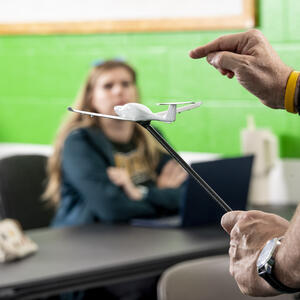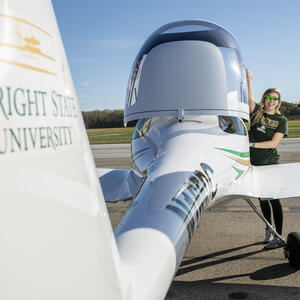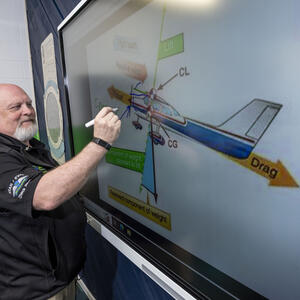On this page:
- Why Choose Aviation Science and Technology?
- Careers
- Real-World Experience
- Academics and Curriculum
- Admission
- Financial Considerations
- Facilities, Simulators, and Learning Equipment
Why Choose Aviation Science and Technology?
Dayton is the home of powered aviation, and Wright State is dedicated to carrying on its namesakes’ spirit of innovation and excellence in flight. So if you’ve ever dreamed of a career in piloting, Wright State’s Bachelor of Science (B.S.) in Aviation Science and Technology is for you. This degree program will give you the education and real experience you need to become an aviation professional prepared to operate effectively within national and international airspace systems in the 21st century. You will be prepared to earn a commercial pilot license and even become a Federal Aviation Administration-certified flight instructor.
Piloting is a diverse field with in-demand career opportunities, and Wright State can help prepare you for them. An aviation science degree can also synergize well with studies in other science disciplines (including engineering), expanding your career options. Wright State's program is designed for students with or without previous flight experience, and you can begin flying as early as your first year—sooner than in most university aviation programs.
Wright State is dedicated to the growth and economic health of the region through an empowered workforce, driven in part by partnerships with organizations like Wright-Patterson Air Force Base. Aviation science is a big part of improving the well-being of our community, and you can contribute through a degree in aviation science and technology.
What Makes Wright State's Aviation Program Different?
- The program's leadership possesses extensive industry experience. Using that experience, Wright State has developed a customized program focused on striving to help you develop into an exceptional pilot, transforming high-quality candidates into elite-level graduates.
- Wright State strives to recruit top-level candidates, accomplished through a rigorous and highly selective screening process.
- Our foundational principle of learning requires you to go beyond the FAA-prescribed minimum skill sets and acquire a thorough understanding of the principles of flight. This approach ensures you will be able to think through the complexities of flight in real time and during real-world situations.
- The program is structured around a team-building concept where all personnel (management, instructors, and students) work hand-in-hand to ensure your success as well as the success of the entire squadron.
- You will develop essential leadership skills through practicing pilot-in-command responsibilities, crew resource management, and team building exercises.
Careers
You can enter a rewarding, in-demand career field by pursuing a degree in aviation science from Wright State. The aviation industry is experiencing a shortage of qualified pilots in the United States. There could be a shortage of as many as 130,000 pilots over the next two decades, opening the door to you for employment soon after graduation.
When you think of piloting, you may consider only airline or military flight roles, but our graduates can also pursue piloting careers in areas such as:
- Law enforcement
- Corporate or charter operations
- Cargo airlines
- Survey piloting
- Governmental contracting
- Flight instruction
- FAA inspection
Airline and Commercial Pilots
An airline pilot primarily flies on a schedule for groups—such as airlines—to transport passengers and cargo. A commercial pilot works in a more free-form flight environment, which can include charter flights, cargo transport, aerial tours, search-and-rescue operations, and more. There are also other types of pilots, such as agriculture or helicopter pilots.
As of May 2023, the median income for airline and commercial pilots in the top industries in which they worked was:*
Airline and commercial pilots and flight engineers
Commercial pilots
Air transportation
workers
*U.S. Bureau of Labor Statistics, Occupational Outlook Handbook

Real-World Experience
Gain the experience and flight ratings you need while pursuing an aviation science degree at Wright State. Accumulate real-world flight time and also train on state-of-the-art simulation equipment. Program activities will teach you about the day-to-day work of a pilot. Mock interviews help you better understand how to begin the career you have dreamed about.
You can also become a Certified Flight Instructor through Wright State’s program. You will acquire more flight hours toward your flight rating goals as you complete your degree work.
Academics and Curriculum
Your curriculum will include information about aviation topics such as flight systems, propulsion, and electronics. Apply the skills you acquire and the knowledge you gain as you begin your career as a professional pilot.
When you graduate from the Aviation Science and Technology B.S. program, you will be able to:
- Demonstrate the skills to successfully adapt to regulatory policies, procedures, and evolving technologies in a dynamic, fast-paced operational environment.
- Analyze and interpret data for problem solving in ground and flight operations.
- Identify modern-day challenges that affect the aviation industry.
- Utilize modern technology to effectively manage professional flight operations.
- Demonstrate the skill sets necessary to begin a career as a professional pilot.
View Bachelor of Science in Aviation Science and Technology program information, degree requirements, and graduation planning strategies in the Academic Catalog.
Admission
Wright State University’s Aviation Science and Technology program accepts a limited number of students each year. Admission to the program is competitive and designed for students who demonstrate a commitment to the profession.
University Admission
New Students
-
Apply to the university. Select the Aviation Science and Technology program on the admissions application. You can also apply on the Common App.
Learn more about the application process for new students.
Transfer Students
-
Apply to the university. Select the Aviation Science and Technology program on the admissions application.
Learn more about the application process for transfer students.
Returning Wright State Students
-
Apply to the university. Select the Aviation Science and Technology program on the admissions application.
Learn more about the application process for returning students.
Admitted Student Guidelines
Once admitted to the university, you should complete all steps of the admitted student guidelines. You must complete the admitted student guidelines to be eligible to register for your first-semester classes. You are encouraged to complete these items several weeks before the start of the semester.
Aviation Science and Technology Program Admission
The following are requirements for admission into Wright State’s aviation program:
- GPA of 2.5 or better
- Must be a United States citizen to take part in any flight training
- If you are on the path to citizenship, please contact Aviation program faculty to discuss options for the program
- Minimum age of 17 for specific courses
- Successful completion of first-semester courses (AVI2000, AVI2001, AVI2002, AVI2004, and AVI2010)
- Obtain Class 1 medical certificate
- Interview with First Flight check instructors and administrators
Financial Considerations
Visit our Aviation Program Financial Considerations page to learn about:
- Program fees: medical, flight labs, exams
- Financial Aid
- Scholarships
Facilities, Simulators, and Learning Equipment
Flight training in the B.S. program is provided by First Flight Aviation, an FAR-141 FAA-approved (certificate #CWBS055D) flight school located at Wright Brothers Airport in Dayton, OH—22 miles from Wright State. Flight instructors are Wright State faculty.
Interested in seeing our flight school and learning more about the program? Join us at Aviation Visit Day for a tour of First Flight Aviation and a program information session. View our available visit dates and access registration links from the button below.
camera Photo Gallery
Explore photos of First Flight Aviation facilities.



